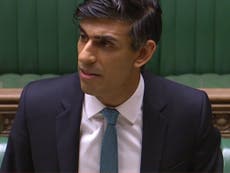Overseas aid cut will not be restored in ‘foreseeable future’, Foreign Secretary admits
Anger as Dominic Raab accuses critics of wanting to cut spending from hospitals, schools, or Covid-19 fight instead
Your support helps us to tell the story
From reproductive rights to climate change to Big Tech, The Independent is on the ground when the story is developing. Whether it's investigating the financials of Elon Musk's pro-Trump PAC or producing our latest documentary, 'The A Word', which shines a light on the American women fighting for reproductive rights, we know how important it is to parse out the facts from the messaging.
At such a critical moment in US history, we need reporters on the ground. Your donation allows us to keep sending journalists to speak to both sides of the story.
The Independent is trusted by Americans across the entire political spectrum. And unlike many other quality news outlets, we choose not to lock Americans out of our reporting and analysis with paywalls. We believe quality journalism should be available to everyone, paid for by those who can afford it.
Your support makes all the difference.The controversial £4bn-a-year cut to overseas aid will not be restored in “the foreseeable future”, the Foreign Secretary has admitted.
The reduction – from 0.7 per cent to 0.5 per cent of national income – has been described as “temporary”, but Dominic Raab told MPs it would not be reversed soon, because of the economic crisis.
The admission came as he provoked anger in the Commons by accusing critics of wanting to cut spending from hospitals and schools, or the fight against Covid-19 pandemic, instead.
One senior Tory demanded “a sunset clause in black and white”, to ensure the government does not backslide on the claim it will be “temporary”.
And Andrew Mitchell, the former International Development Secretary, accused Mr Raab of overseeing “a dismal start to our G7 premiership”, starting in January.
He warned that family planning would be swiped from 7 million people, “with all the misery that that will entail”, 2 million children would suffer malnutrition and 1 million girls “will not be able to go to school”.
“These reductions make little difference to us in the United Kingdom, but they make a massive difference to them,” Mr Mitchell warned.
Mr Raab confirmed the cut would require legislation – allowing Tory rebels to try to defeat it, probably in January – because of fears it would be overturned in the courts otherwise.
He acknowledged he could not “see a path forward back to 0.7 in the foreseeable or immediate future”, insisting it would depend on future “fiscal circumstances”.
Tom Tugendhat, the influential Conservative chair of the Commons Foreign Affairs Committee, demanded the sunset clause, telling Mr Raab: “Does he understand why so many of us are disappointed?”
Anthony Mangnall, a backbench Tory MP, said he was “horrified” by the cuts, while Hilary Benn, a former Labour International Development Secretary, branded it “unforgivable”.
However, Mr Raab did appear to dump a plan to change the global definition of aid, which would have allowed cash to be diverted to items such as new cyberweapons and AI-enabled drones.
“We will remain committed to following the rules set by the OECD’s Development Assistance Committee,” he said, in a move that will disappoint some Conservative MPs.
It is unclear how much aid will be cut in 20210 – because the 0.5 per cent proportion of gross national income (GNI) depends on the size of the economy – but it expected to be around £4bn.
Stephanie Draper, chief executive of Bond, the network for aid organisations, said: “Aid had already been cut as GNI fell, and thousands more lives will now be lost.
“If the government manages to get the proposed changes to the Act through parliament, at a minimum, they should include a sunset clause that would return the 0.7 per cent commitment automatically – rather than continuing to play politics with the aid budget.”






Join our commenting forum
Join thought-provoking conversations, follow other Independent readers and see their replies
Comments